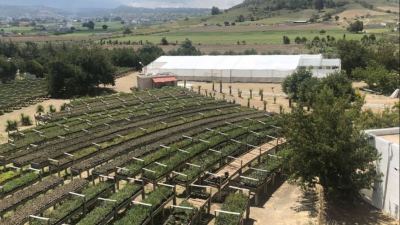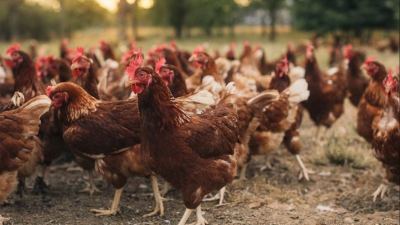Mycotoxin Management
What are mycotoxins?
Mycotoxins are natural substances produced by moulds and fungi. They are invisible, stable and toxic chemical compounds. Mycotoxin contamination is common in the farm environment, as they can survive in many places and on many different types of feed sources.
The growth of moulds — and, as a result, mycotoxin production — are most encouraged by environmental conditions such as temperature (hot/cool) and moisture (wet/dry). However, mycotoxins can also be produced by moulds when the host plant or the mould are exposed to other stress conditions.
Ever-present in the farm environment and a potential threat to the productivity of even the best-run livestock production operations, mycotoxin contamination should be on every feed producer’s and farmer’s radar.
Types of Mycotoxins
More than 500 different mycotoxins have been identified to date, and most animal feedstuffs are likely to be contaminated with multiple mycotoxins.
The most extensively studied mycotoxins are those produced by the molds Aspergillus, Fusarium, Penicillium and Claviceps. Some of the key mycotoxins produced by these molds are aflatoxins, trichothecenes, ochratoxins, deoxynivalenol (DON, vomitoxin), T-2/HT-2 toxins, zearalenone, fumonisins, mycophenolic acid, cyclopiazonic acid and ergot alkaloids.
For more details on the various types of mycotoxins, please visit knowmycotoxins.com
Mycotoxin Symptoms
Although we continue to gain a greater understanding of mycotoxins, they often remain a hidden threat and are likely to be responsible for numerous undiagnosed health and performance issues in livestock worldwide. Mycotoxins impair optimal livestock performance by affecting the animal’s intestinal, organ and immune systems — which, in turn, has an obvious subsequent negative impact on farm profitability. Animals can ingest mycotoxins from numerous different sources, including pasture, preserved forages, grains, byproducts, complete commercial feeds and bedding materials.
For the majority of livestock producers, the presence of mycotoxins is more likely to result in a subtle, chronic problem rather than acute issues, but the outcome in all cases will be reduced performance and lost profits. The specific symptoms and impacts will vary based on the severity of the mycotoxin contamination, the types of mycotoxins ingested and the species type. However, mycotoxins will typically affect the bottom line of livestock operations through:

Why is the control of mycotoxins so important?
Animal productivity and farm profitability
Mycotoxins are hidden thieves and are likely to be responsible for numerous undiagnosed health issues in farmed livestock around the world. For most livestock producers, the presence of mycotoxins is more likely to result in a chronic issue that manifests over a longer period of time but that may not always result in acute symptoms. Mycotoxins impair optimal livestock performance by affecting the animal’s intestinal, organ and immune systems — which, in turn, has a subsequent negative impact on farm profitability.
Safer and healthier food for consumers
With ever-increasing demands from the end consumer and the growing concern surrounding food quality, animal feed safety has become a significant topic in agriculture. There is increasing pressure throughout the supply chain to ensure clean and safe feed for animals, which helps deliver a safer and healthier supply of food for consumers. It is increasingly clear that an effective mycotoxin control program is vital to protect the health and well-being of both animals and the consumer.
Alltech’s Mycotoxin Management Program
Alltech believes that effective mycotoxin management is about seeing the whole challenge — from the farm to the feed mill and from risk assessment to feed management. To effectively manage the inevitability of feed mycotoxin contamination, it is crucial to understand the level of the mycotoxin challenge so that the right steps can be taken to mitigate any adverse effects on animal performance, production efficiency and food safety.
The Alltech® Mycotoxin Management program provides solutions for pigs, poultry, aqua, pets, equines, dairy cows and beef cattle. Using a combination of powerful management tools, Alltech’s Mycotoxin Management program provides a complete, cutting-edge, global solution to help producers take control of mycotoxin contamination and protect their business. The program is built around next-generation risk identification technology, data analysis and insights, and mycotoxin binder solutions that are designed to reduce the damaging effects of mycotoxins on animal health and production potential.
Almost 90% of mycotoxin contamination is found to develop in crops pre-harvest, highlighting the importance of effective crop management in reducing the mycotoxin risk. Alltech’s Mycotoxin Management program has three steps:
- Identify the risk with 37+ and Rapiread.
- Quantify the risk with our Mycotoxin Management Portal.
- Mitigate the risk to protect contaminated feedstuff.
Canada’s Regional Harvest Analysis
As a part of our management program, we test hundreds of crop and feed samples across Canada during the harvest season to better understand current mycotoxin levels and the threat they will pose to our livestock for the coming year.
Our experts review and interpret the collected data so they can share their insights on what it means for you.
While there are several important factors and data points to consider, here are a few key takeaways:
- 100% of the samples analyzed had 2+ mycotoxins
- Major risk is from type-B trichothecenes (DON group
- Timely and continual testing is key to identifying mycotoxin risks
If you missed our yearly Canadian Harvest Analysis webinar, you can view the recording below. Additionally, we produced a detailed follow-up report which you can download and view that highlights the topics covered in the webinar.
Download 2022 Canada Harvest Analysis Report
Alltech provides mycotoxin testing throughout the year, not just upon harvesting. All of the results and important information from the analysis will be available through the Mycotoxin Management Portal, your one-stop shop for sample collection and mycotoxin testing results. This intuitive digital platform makes it even easier to focus on the crucial data that matters to you. Speak to your local Alltech representative to learn more, including how you can sign up to access the portal.
For more information on our program and products please fill out the form below.















